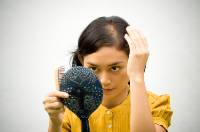Hair loss treatment for a woman is a wide-ranging topic. From herbal teas to hair transplants, women have many options and tools for fighting hair loss. Nearly 40% of women by age 60 experience some form of hair loss — so take heart if you’re among them. Effective treatment is available. The best hair loss treatment for a woman is information. The more you know, the more informed your choice of treatment will be.
There are 3 major types of hair loss in woman: androgenic alopecia, telogen effluvium and alopecia areata. When looking for a hair loss treatment for a woman, it’s important to understand what type of hair loss you have.
Androgenic alopecia occurs because of genetics and hormones. Some women inherit a sensitivity to the hormone dihydrotestosterone (DHT). This sensitivity extends to the hair follicles on the scalp. A woman’s body has low levels of testosterone in it — produced by the ovaries and adrenal glands. The testosterone is kept in check by estrogen. When estrogen levels fluctuate or decline, testosterone becomes more abundant. This extra testosterone becomes DHT via the action of an enzyme named 5-alpha reductase. When carried to the scalp in the blood, the overabundant DHT attacks genetically-sensitive follicles, causing them to miniaturize and eventually to stop producing hair. Women with this type of hair loss experience diffuse thinning all over the head, but especially at the front, just behind the hairline. Hair loss treatment for a woman with androgenic alopecia often combines estrogen with growth stimulators.
Click Here To Learn More About Hair Loss Treatment For A Woman!
In telogen effluvium a large proportion of the hair falls out at once. This may be related to hormones but also has many other causes. Some women report hair loss when taking birth control pills, others when stopping them. Hair loss can happen after the birth of a baby but is completely temporary. Thyroid imbalance is another very common cause. Hair loss treatment for a woman with thyroid imbalance involves bringing the levels to normal via a course of medical treatment. Hair loss will usually reverse. Nutritional factors, like a vitamin A deficiency, crash dieting, self-starvation or alcoholism can also contribute to telogen effluvium. A combination of a healthy diet and psychological counseling are the appropriate treatments here. Delayed hair loss can occur months after a severe fever or systemic illness like Crohn’s disease (an inflammatory disorder of the gastrointestinal tract), hepatic (liver) disease, renal (kidney) disease, syphilis and diabetes. Medical treatment for these conditions usually reverses hair loss.
There are many drugs that cause telogen effluvium including blood pressure drugs, anti-arthritics, anti-cancer drugs, anti-coagulants, anti-gout medications, anti-depressants, anti-Parkinson drugs, anti-ulcer drugs, beta blockers, bipolar drugs, cholesterol-lowering drugs, heavy metals, steroids and pesticides. Hair loss treatment for a woman taking these drugs usually involves discontinuing the medication and/or switching to a different variety of drug.
Alopecia areata is characterized by a patchy hair loss that occurs suddenly or all at once. Although the exact cause is unknown, researchers think it’s related to an autoimmune response in which the body begins to treat hair follicles as foreign objects and attacks them. Treatment involves steroid injections, immune system enhancers, systemic steroids, minoxidil and cyclosporin. This condition is difficult and hair loss treatment for a woman with alopecia areata should only be undertaken by a physician by a physician, since there may also be underlying medical causes like thyroid disease, Hashimoto’s disease (an autoimmune disorder), pernicious anemia and rheumatoid arthritis.
If you suspect your hair loss is due to any of these causes, remember that hair loss treatment for a woman is widely available. But first see your doctor for a medical diagnosis. Only then will you be able to embark upon an effective course of treatment.
Click Here To Learn More About Hair Loss Treatment For A Woman!

